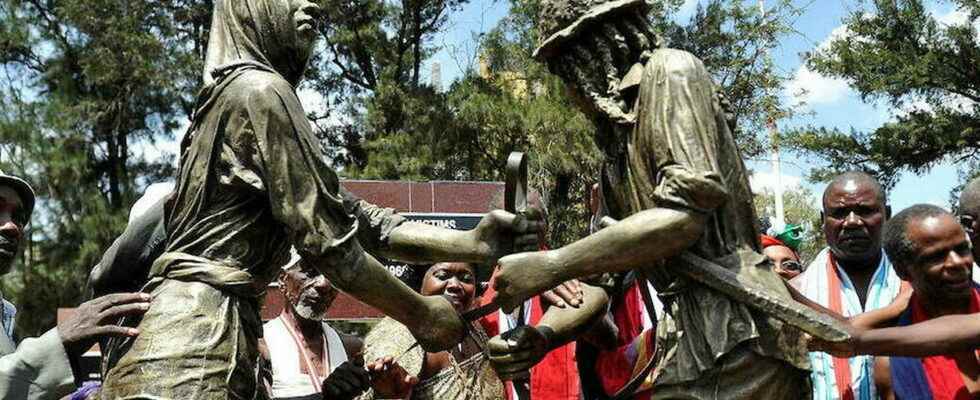To When Elizabeth was born in 1926, the British Empire spanned six continents. During his reign, which began in 1952, most of the 56 countries that make up the Commonwealth gained their independence, including many nations on the African continent such as Ghana, Kenya or Nigeria. His death comes at a time when European countries are under pressure to come to terms with their colonial history, atone for past crimes and return stolen African artefacts kept for years in museums in London or Paris.
From Kenya to Nigeria to South Africa, the death of Queen Elizabeth II has sparked an avalanche of condolences from African heads of state, praising an “extraordinary” leader and sharing memories of her frequent visits to the continent in seventy years of reign. Nigerian President Muhammadu Buhari and Kenyan President Uhuru Kenyatta were among those who expressed condolences over the loss of an “icon”. That said, the monarch’s passing has also reignited a sensitive debate about the colonial past in Anglophone Africa, including the queen’s role as head of state during British rule. Many Africans have thus evoked the tragedies of the colonial era under his reign.
READ ALSODeath of Elizabeth II: Africa reacts
The cruel memory of the repression against the Mau Mau
Like in Kenya, where the Mau Mau revolt against colonial rule from 1952 to 1960 killed at least 10,000 people in one of the British Empire’s bloodiest crackdowns. Britain agreed in 2013 – more than half a century later – to compensate more than 5,000 Kenyans who had suffered horrific abuses during the revolt, in a deal covering nearly 20 million pounds (23 million euros). “The Queen leaves a mixed legacy of brutal repression of Kenyans in their own country and mutually beneficial relationships,” wrote The Daily Nation, Kenya’s leading newspaper, in a weekend editorial. As a reminder, Elizabeth was visiting Kenya in 1952 when her father died and she became queen. “What followed was a bloody chapter in Kenyan history, with atrocities committed against a people whose only sin was to clamor for independence. »
READ ALSOElizabeth II: the secrets of a queen’s longevity
Denunciation of British support for the federal army against Biafra
In Nigeria, the most populous country in Africa, the reverse scenario is the same. President Muhammadu Buhari honored the monarch, saying his country’s history “will never be complete without a chapter on Queen Elizabeth II”. In fact, while some have praised the role she played until Nigeria’s independence, others have pointed out that she was head of state when Britain supported the Nigerian military during the war. civil of the country. It should be remembered that more than a million people died during the Biafra war, between 1967 and 1970, mainly from hunger and disease, during the conflict which followed the declaration of independence by officers of the Igbo ethnic group in the southeast of the country. “If anyone expects me to express anything other than contempt for the monarch who oversaw a government that supported the genocide that massacred and displaced half my family (…), you are dreaming”, has said Uju Anya, a Nigerian-American scholar, on Twitter, sparking a heated debate on social media.
READ ALSOElizabeth II, one life, one reign
Mixed reactions in South Africa as well
In South Africa, reactions are also divided, between President Cyril Ramaphosa who deplored the death of an “extraordinary” figure and a part of the youth who refuses to celebrate it. As South Africa’s radical left Economic Freedom Fighters (EFF) party wrote in a statement: “We do not mourn the death of Elizabeth because, for us, her death is a reminder of a very tragedy in the history of this country and of Africa. “During her seventy years of rule, she never acknowledged the atrocities that her family inflicted on the peoples that Britain invaded around the world,” the party added, referring in particular to the trade in slaves and colonialism.
READ ALSOElizabeth II: her complicity with Mandela revealed
Mukoma wa Ngugi, son of world-renowned Kenyan writer Ngugi wa Thiong’o and novelist himself, as well as a professor at Cornell University, has also questioned the Queen’s legacy in Africa. “If the Queen had apologized for slavery, colonialism and neo-colonialism and urged the crown to offer reparations for the millions of lives taken in her/their name, then perhaps I (…) would feel wrong,” he wrote on Twitter. “As a Kenyan, I feel nothing. This theater is absurd. »
